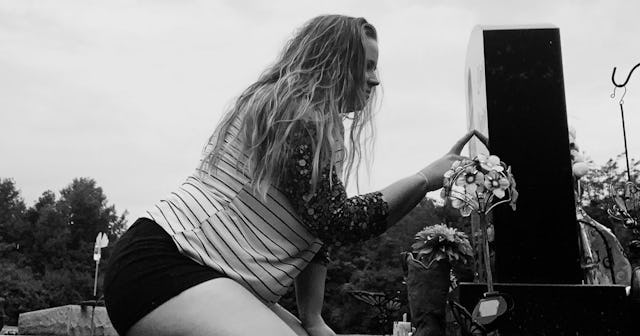I Can't Stand The 'Kept The Kids Alive Today' Phrase

Trigger warning: child loss
It took one moment for my daughter to die… just one.
As a mother, it was my duty to protect her, to help see her through the rest of her childhood tomorrows, but I couldn’t do it. My love for her was and is still so powerful, but even that invisible force wasn’t enough to save her. And since then, I have spent a billion and counting of my moments trying to make sense of that one.
Following the initial shock of it all, I believe it to be instinctual the way I felt like I had completely and utterly failed my daughter and the rest of my family. I was Mama Bear, a fierce and loving nurturer to my kids. And somehow, some way, by one moment of horrible, rotten luck, I lost one of my children.
Courtesy of Caila Smith
I felt lower than the most negligent of mothers. I felt like everyone, including me, would always see me as the mother who couldn’t succeed at motherhood. It didn’t make sense, so I blamed and hated myself for it.
My child died. And in my eyes, that meant I had already failed.
I’d be lying if I said that, at times, I didn’t think the what ifs might kill me. My chest would painfully churn, my flashbacks never paused and there were many times my grief resembled the physical pain of the only way I can imagine what a heart attack might feel like.
There was no more saying, “At least I kept the kids alive today,” for me anymore, just a giant elephant dangling in thin air when anyone around me chose this phrase in conversation. Family pictures left me with not only a hole in my heart, but an empty space visually seen in every photograph. Doctor’s office registration papers turned my stomach into knots. My heart was an anchor every moment of every day. And through it all, every horrific moment, the weight of my self-blame began to build.
And build.
And build…
I was breathing, but even that gave me immense guilt that I had no idea how to deal with. Again, it felt as if merely continuing to exist meant I had failed even more. Countless, innocent comments began to circulate from others as a means to lift me up, but they often tore me down.
“I couldn’t live if my child died.”
“Nope, I can’t imagine and I don’t want to.”
“I couldn’t go through what you’ve been through.”
What they didn’t know is that I used to think, and continued to think, those same thoughts too. But I couldn’t stop my heart with my daughter’s.
Courtesy of Caila Smith
And I hated the world for their naïve and mistaken belief that it was so. I loathed them for their insinuations they didn’t mean to harm me with… the ones that became contorted in my own head which told me that only the parents who do not deeply love their child can continue existing without them.
This loss wasn’t a choice. My grief was not optional, it was a response to my loss.
I didn’t always want to or think I could continue walking, talking, or breathing after my child died, but my human body defied what my throbbing mommy-heart felt. The world never stopped turning for this bereaved mother. I couldn’t rewind the clock to play out all of my “what ifs” to see if they made any difference, no matter how fiercely I longed to defy the laws of time myself. I couldn’t let my children live their childhood with their lives stuck on the most tragic pause. And, my most nightmare-ish reality I had to come to terms with? I couldn’t save my daughter no matter how badly I desperately wanted to.
These were my chaotic burdens. And I had to learn how to face each one of them piece by piece. Moment by moment.
Because up until then, I had this picture-perfect image of how my life was supposed to go. My family was meant to live in the same state of happiness we lived in before my daughter’s death, and it was supposed to last until we were all old and gray. But when the life story I’d already written out was destroyed in an instant, my instinct was to feel feelings of failure and an immensely heavy load of self-blame.
Courtesy of Caila Smith
But today, right here and now, I’m able to see a bit more clearly. Feeling like I had failed after my daughter’s death wasn’t failure at all really… not in the slightest bit. It was my body’s response to grief and secondary grief. The ripple effect that keeps on rippling, if you will. And I had to deal with all of it.
I had to learn how to accept my daughter’s early, unexpected, and horrible death for exactly what it was, no matter how big of a failure it made me feel I was or how painful it felt. I was forced to realize that not everyone will understand me now, and that’s okay.
For my own good, I had to teach myself how to let go of what was supposed to be so I could make room for the beauty of what actually is right here and now.
Through moment by moment repetition, I had to remind myself that I am still my daughter’s mother. Even in death, I am still a parent to her. She is still my surviving children’s big and little sister, and we honor her memory daily.
I had to forgive myself for not being the hero in my own daughter’s story.
Because although my child died, I have not failed.
This article was originally published on